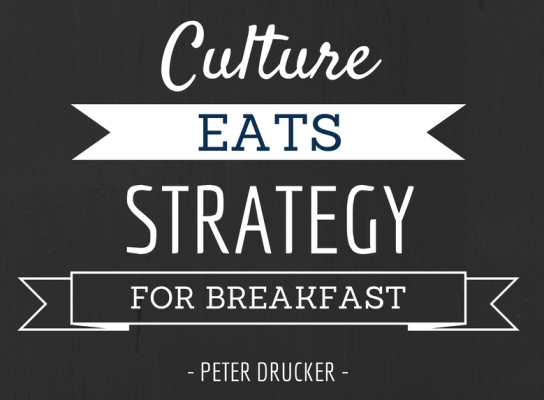Why Culture Matters
- November 17, 2016
- Posted by: jsagar@marketingmo.com
- Category: Leadership and People

Have you ever heard the statement “culture eats strategy for lunch?”
The concept was originated by the late Peter Drucker, and the quote later refined by Mark Fields of Ford Motor Company. The idea behind the concept was not to take sides between strategy and culture (meaning one is better than the other), but to highlight that the amount of time that business executives spend on each is out of proportion compared to their contribution to the company’s success.
Drucker often argued that a company’s culture would trump any attempts to create a strategy that was incompatible with its culture. And he would also argue that company cultures are like a country’s culture; instead of trying to dramatically change one, work with what you have.
More simply put, executives spend far too much time on strategy compared to culture, when culture has a greater impact on results.
Subconsciously, we experience the effects of culture on our company’s performance every day. Dr. Daniel Denison, one of the preeminent researchers on corporate culture, gives two examples of how we experience corporate culture.
Example 1:
“Oh, just ignore those. We’re supposed to fill them out, but I don’t know how to, and nobody checks.”
What cultural message is this sending? It’s telling people that rules aren’t followed, training is not adequate, and there’s no feedback loop to inform decision-makers.
Example 2:
“We all work late if there’s a deadline. Bosses, hourly, salaried, temps, even the cleaners sometimes pitch in to get the job done correctly and on time.”
What cultural message is this sending? Everyone feels like they make a difference, people work well in teams, and everyone understands what they need to do to achieve success for the company.
It’s pretty obvious that over time, the company in example 2 should outperform the company in example 1. How would the company in example 1 be able to adequately execute on the strategy delivered from the leadership?
Dr. Daniel Denison and his team have studied and measured the culture of nearly 1,000 organizations, from multiple industries regions and sectors, and rated them in specific criteria. His findings have allowed him to correlate the cultural traits of the model to the specific performance metrics that are important to organizations, such as ROI, ROS, ROE, overall growth, high operating performance, team chemistry, commitment, and employee satisfaction.
It’s inexpensive for your people to take the survey, and the insights you receive from it far outweigh the cost and time to complete.
If you’re interested in seeing how your organization compares to other companies in the areas that are most important to you, connect with me and I’ll be happy to get you started. I’m a certified Denison organizational culture advisor and can deploy the test to your organization and guide you through the results.
It’s one of the most important and most valuable assessments I’ve ever seen. I recommended it for every company.




